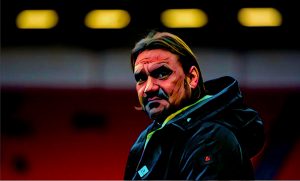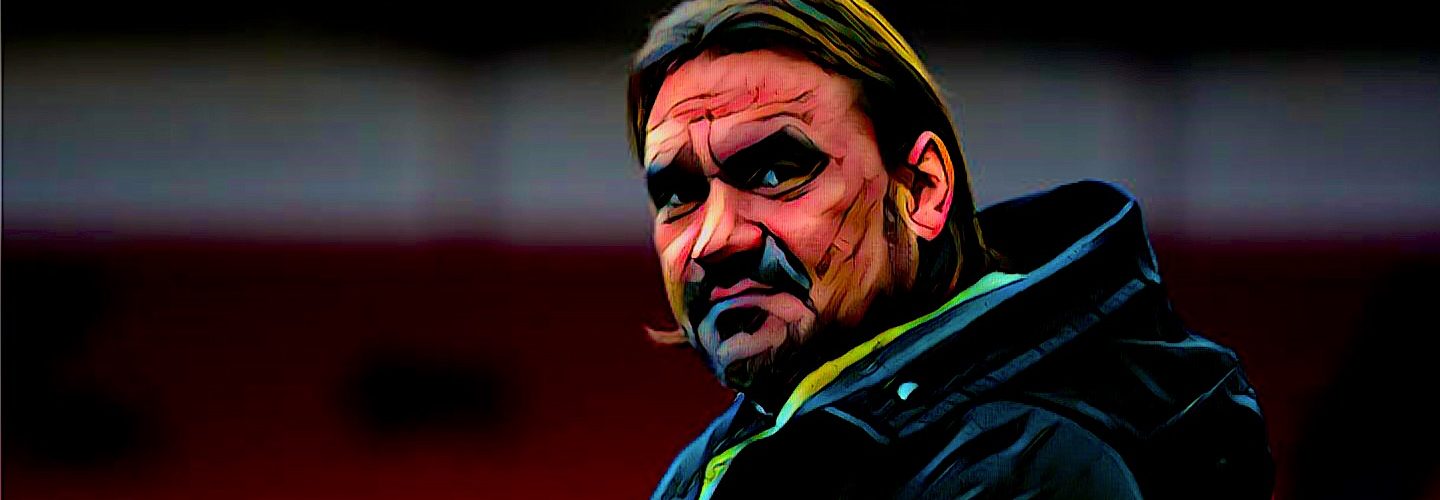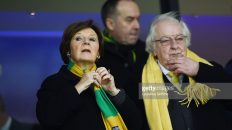When the wheels came off Alex Neil’s attempts to lead Norwich City back to the Premier League at the first time of asking, the Canaries found themselves at a crossroads.
Norwich would do something different in a bid for a brighter future.
The Canaries scrapped the structure of a Manager and a Chief Executive, instead opting to appoint a Sporting Director in the shape of Huddersfield’s Stuart Webber who would then lead the hunt for Norwich’s first ever Head Coach.
That man, eventually, would be Borussia Dortmund II’s Daniel Farke, a man who never actually planned on being a coach yet has proven himself to be rather good at it.
Following in the footsteps
Travel back into the late 1990s and a young Daniel Farke played a handful of times as a striker for TuS Paderborn-Neuhaus – who would later become SC Paderborn – before really finding his feet at SV Lippstadt 08 (SV 08).
As a striker, Daniel was following in the footsteps of his grandfather, Franz, who had played for Borussia Dortmund in the 1950s. Franz scored 17 goals as Dortmund won the Oberliga West in 1952/53 – the highest level of German football until the formation of the Bundesliga in 1963. While Daniel wouldn’t wear the colours of Dortmund as a player, he would prove as prolific as his grandfather, beginning in the 1999/00 season where he scored 16 times for Lippstadt.
The following season, he’d find the net 25 times before leading the scoring charts in the Oberliga Westfalen in the 2002/03 season with an impressive 28 goals. A move to SV Wilhelmshaven wouldn’t stifle Farke’s goalscoring prowess as he racked up a tally of 23, before the goals dried up a little the following campaign.
Farke would also play for the likes of Bonner SC and SV Meppen, while returning to SV Lippstadt on two occasions. At the same time, Farke had started to study economics at the University of Paderborn in a bid to learn about matters such as contracts and taxes. Once retiring in 2008, Farke’s goal was to become a Sporting Director and very soon he’d do just that… with a catch.
A helping hand
Farke’s old side, Lippstadt, were in crisis. In 2008, the club had to cut the salaries of its coaches and players. It was austerity measures across the board.
According to Brigitte Rühlemann, Vice President of the club, “We shut everything down.”
The club had fallen into the Westfalenliga – the second highest amateur football league in Germany – and had failed to mount an immediate return to the Oberliga Westfalen. The club’s Sporting Director, Werner Schröder and Head Coach, Holger Wortmann, had both quit the club for personal reasons. Now former Vice President of the club, Kai Hartelt, said that they were on the ground both financially and sporting wise.
The man they turned to was their old striker, Daniel Farke.
Farke had done a coaching course at this point, in a bid to build his understanding of what it’s like to be a coach to aid his future work as a Sporting Director. Lippstadt wanted him to do both jobs, at least until the end of the season. Farke explained that the plan was for him to take charge of the team for the final weeks of the campaign before handing over to a successor in the summer.
Factor in excellent form and Farke enjoying the role, plans changed.
The fightback begins
In Farke’s first full season in charge, he led Lippstadt to a second-placed finish in the Westfalenliga, relying primarily on young, hungry talents from the region.
Up front, Manuel Eckel would score 40 goals in 33 games, earning him a double page spread in Sport BILD, as Lippstadt finished eight points shy of promotion. Yet, there was still plenty of unrest to overcome and that was perhaps reflected in a 7th placed finish the following campaign. By the 2011/12 season, however, Lippstadt were well placed to take the league by storm.
Now, things were starting to settle down and in early 2011, a substantial restructuring took place. Farke became Sporting Director for the whole of the club. He would now be responsible for the “final decision” in all sporting matters and areas – all the way up from the junior sides through to the seniors. In an interview with The Guardian ahead of Norwich’s Capital One Cup tie with Arsenal last season, Farke reflected on the experience, explaining:
In a small club you have to do everything: negotiate with the bus company, do all the contracts, all the press work, all the coaching work. It was really exhausting. There was very little time for other experiences and to see how other coaches work and how people work in different countries. And then I became really focused on a new stadium. I had to sign a contract for three years because all the sponsors said: ‘We will only support if Daniel Farke is sporting director and coach’.
Though the work was exhausting, the goal was promotion going into 2011/12. Farke had a stronger, bigger squad at his disposal and while it would be “very difficult”, it was undoubtedly his aim.
A reform of the league system was taking place, meaning that the first five to six teams in the Westfalenliga would be promoted to the newly revived Oberliga Westfalen for 2012/13. Opportunity was knocking. Opportunity that Lippstadt would grasp with both hands over the course of a remarkable campaign, one which saw them win the league with 87 points, lose just once (sparking an unbeaten run that would last 13 months) and boast the best record of any side in the first six tiers of German football.
It also set them up with a two-legged play-off against SSVg Velbert for a chance to be promoted into the Regionalliga West – meaning that they would have achieved a double promotion in one go.
A great encore
Farke felt the games against SSVg Velbert were a “great encore” for the story Lippstadt had written that season – with the goal of promotion already achieved.
They would lose both legs 2-1. It was a bitter moment, according to Farke, and a chance that may not come again. He was full of praise for his players who had given everything but admitted he needed to take some time to decide his own future. His contract was up for renewal at this point. After “three intensive years”, he wanted to let everything sink in before making any decisions.
Yet, just a few days later, Farke decided to stay in his dual roles until 2015. It was announced at the club’s annual general meeting, with the Westfalenpost speaking of “joy and relief” for the club and fans following “weeks of trembling and anxiety”. The club’s Chairman, Dr. Forusan Madjlessi praised Farke’s impact, outlining his positive energy, empathy along with sporting and business expertise.
Even Lippstadt’s website today says that the club’s sporting success at this point was mainly associated with the name, Daniel Farke. Farke was modest, playing down his impact, and talking up the potential for great success.
Greater success that he’d lead the club to in the following season.
A phoenix from the ashes
After winning the Westfalenliga, SV Lippstadt would get over the defeats against SSVg Velbert by ensuring they were pushing for promotion in the Oberliga Westfalen.
Come March 2013, it was becoming clear that Lippstadt could well be set to pull off successive promotions. At an entrepreneurial evening, Chairman of the club’s Supervisory Board, Norbert Loddenkemper, paid tribute to the “outstanding work” Farke had been doing. There had been a philosophy of focusing on developing players that were young and hungry from around the region, one bearing real fruit with Lippstadt within touching distance of facing off with “traditional clubs”. These were clubs they had only previously known through history books or on TV.
Lippstadt would win the Oberliga Westfalen in May, capping a “unique” accomplishment in the words of Farke – drenched in beer and champagne by his players.
They would now be in the fourth tier of German football. They also now had entry into the first round of the DFB-Pokal, setting up a clash with Bayer Leverkusen. Lippstadt would be on the big stage of German football for the first time.
The DFB (German Football Association) described the Lippstadt story as being like a “phoenix from the ashes” when interviewing Farke before the game. Farke was described as “instrumental” in Lippstadt’s “spectacular” rise. Farke attributed to the success to the club as a whole and when asked about his own future, he simply said that while he had, had offers, he hadn’t felt like his work was done.
Daniel Farke, Fußball-Lehrer
Along with his work as a Coach and Sporting Director, Farke had also been working towards his Fußball-Lehrer degree on a 10-month course at the prestigious Hennes Weisweiler Akademie. A place where training of coaches “sets the standard in Europe” according to Fran Wormuth, the German FA’s head of coaching education.
In 2008, the Fußball-Lehrer was made equivalent to the UEFA Pro License. The degree involved over 800 hours of study (supposedly, the same qualification can come from the English FA after 202.5 hours according to the Bundesliga website) with places on the course incredibly difficult to come by.
Yet Farke had made it on. Not only that, he’d flourished.
Remarkably, he had finished as third best on his course despite juggling his multiple roles. Farke remarked that he wasn’t interested in whether he’d finished third, eighth or 11th, the main thing was that he’d had a “really great education” and “a lot of fun”.
It brought a wildly intense year to a close for Farke who had, had little free time and hadn’t been home much – though his family had supported him throughout. During this time, he’d continued to maintain his duties at Lippstadt, missing just 13 training sessions between July and December 2013, often planning things in his head as he was driving to and from Lippstadt and Hennef, where the Hennes Weisweiler Akademie is based.
Farke never had any intention of spending less time at Lippstadt. He explained the club was very much tailored to him and he was fully aware of the responsibility he had as they tackled their first Regionalliga season.
A bridge too far
At this point, Lippstadt had seen a bright start fade into a season of struggle though Farke remained upbeat.
The newly qualified Fußball-Lehrer acknowledged that Lippstadt were just one of three clubs in the league not working under professional conditions. They also had the smallest budget. That having been said, he was proud of his players’ efforts and assured they would fight until the last day for every point and every goal at any place. When quizzed on what the future held for him, Farke spoke glowingly on Lippstadt. It was a place he could develop many things structurally and strategically. He could look long-term. There was no set career plan for himself, it was a case of him only taking jobs where he felt completely convinced of the project at hand.
Ultimately, the 2013/14 season would prove a bridge too far despite a brave effort from Farke’s Lippstadt side. They were narrowly relegated back to the Oberliga.
A slow start to next season would follow, perhaps suffering from a relegation hangover, though Lippstadt overcame this and began finding their feet.
However, come the winter break, Farke would make a big decision on his future.
The end of an era

In December 2014, it was announced that Farke would leave Lippstadt at the end of the season, not renewing his contract.
According to SV 08’s former Vice President, Kai Hartelt, “Farke saved the club.” Hartelt said that during their first ever conversation, Farke had pledged to hand a stable, healthy club over. Initially, Hartelt joked he had been sceptical but said that Farke had more than delivered on his words. He mapped out how Farke had changed the structures of the club and built it into a powerful force. Hartelt said that there was no doubt that SV Lippstadt 08 stood where it did today due to Daniel Farke. A club that had a first-class reputation far beyond the city of Lippstadt. He added that there was no doubt the Daniel Farke era had been one of the most successful times in Lippstadt football.
Farke, meanwhile, felt it was the right time to pass the baton on but stressed Lippstadt would always be his club. Despite an unbeaten 2015, Farke’s men couldn’t quite recover from a slow start to snatch promotion. While there was no fairytale ending, there was an emotional send-off for the most successful coach in Lippstadt’s history when he rode horseback around the stadium (see above) with performers from the Karl May Festival on hand to assist.
As for his next move, Farke planned to take a break. It was a chance to broaden his horizons. In time he would return, perhaps as a Coach, perhaps as a Sporting Director – but not both.
A short-lived sabbatical
On 1 November 2015, David Wagner would leave Borussia Dortmund II for pastures new. There was talk he would link up with Jürgen Klopp at Liverpool but, instead, he would join forces with Stuart Webber at Huddersfield.
It meant that Dortmund’s second side needed a replacement. They turned to Farke who was planning on a year off but couldn’t turn down the “exciting request” that had come his way. His first task would be stabilising a side – including the likes of Moritz Leitner, Christoph Zimmermann and Marvin Ducksch – flirting with the relegation places in the Regionalliga West and then advancing the project. He would be assisted by a former player of his, Edmund Riemer. From the Dortmund side, Farke was a man that they had been watching for a while. Junior Coordinator, Lars Ricken, said Dortmund were certain that they had found the right man technically and from a human standpoint for their U23 side.
Farke steered Dortmund II from 15th to 4th in his first campaign, losing just three times in the process.
Ruhr Nachrichten painted a picture of a 39-year-old that embodied what he demanded of his BVB II team: a down-to-earth attitude as he made and served coffee at the training centre and dragged crates of water up the stairs. They had sat down with Farke to reflect on his first season in Dortmund.
Farke felt the side had undergone a “super development” sporting wise and proven that they were one of the best in the division. He had been enjoying his time and the framework he was working under – working closely with Ingo Preuß, Dortmund II’s Sporting Director. He also would touch on what it was like being in charge of Dortmund’s second team, explaining that the training of the players and the way they played football was more important than the results. That having been said, Farke considered himself a methodologist and believed that in the long-term, content and methodology would always prevail, thus taking care of results anyway.
Ahead of the forthcoming season, Farke mapped out his goals as playing football as U23s from Borussia Dortmund – something that would define whether they offered players a “top education”, something that would define whether players from the first-team had the opportunity to gain experience in a good group, and would define whether or not they offered the fans attractive football. Another goal was to develop Dortmund’s talents and introduce them to the first-team. Finally, there was the goal of winning every game and finishing as high as possible – but Farke stressed that would only develop from goals one and two.
The man who didn’t want to be a coach
Farke’s Dortmund II side would go unbeaten until March 2017, seeing the likes of Stuttgart linked with a move for the young coach.
Instead, he would continue his good work at Dortmund and sit down with SPOX in December 2016, who brought a scandal to his attention. Despite his tremendous accomplishments at Lippstadt and outstanding work at Dortmund, Daniel Farke did not yet have a Wikipedia page. An amused Farke played it down, along with social media as the whole, suggesting it’s always better to leave people wanting more.
Farke would also reveal that he had never wanted to become a coach. it had never been a goal. Yet here he was, beginning to make a real name for himself.
He would also delve into the working conditions at Dortmund and the relationship between himself and first-team coach, Thomas Tuchel. Farke acknowledged that Tuchel and himself had plenty in common in terms of the way they want to play football and shared a very good working relationship, but stressed that it was the club setting the direction and a case of the coach being the right fit. He explained that the philosophy and game idea of the club must come before everything else.
Another aspect of his role as Dortmund II head coach was the constant turnover of players from season to season.
Farke explained he always reinvented himself a little to bring his ideas to the players, but reiterated his belief in the methodology of what he was doing. He said he was never someone that wanted to just scrape a few points together each week. He believed that as a Fußballlehrer you had to think pragmatically and focus on your methods.
Dortmund II would finish 2nd in the Regionalliga that season, losing just three times, conceding just 25 goals, but drawing 15 games – stifling any hopes of winning the league.

Mission complete
Farke would decide not to extend his contract with Dortmund II in favour of seeking out a new challenge.
He felt that his mission had been fulfilled. He looked back to the first conversation he had with his players and told them it was a case of stabilising themselves and getting the situation under control, but it was also a case of showing pride and identity as Dortmund U23s. He wanted to build an U23 side appropriate for BVB. In his mind, he had now done just that.
While it was a very difficult decision to leave, he also wanted to test himself with a first team, where everything would be geared towards getting the greatest possible success and he now had the opportunity to do that.
Ruhr Nachrichten tipped a “successful career” as imminent for Farke, who they said was simply too good for the Regionalliga West. From his results, the side’s dominant style and the echo of the team all suggested he would go and do great things.
A great adventure
Farke would not have long to wait after deciding to leave Dortmund as he became Norwich City’s Head Coach at the end of May 2017.
Sporting Director, Stuart Webber, explained he had spent a lot of time getting to know Farke’s methods and how he works. Webber hailed Farke as the “outstanding candidate” and noted Dortmund II’s style of dominance in possession and defensive resolve, promising that Farke would bring a “certain style and identity to us that the fans can relate to”. Farke himself felt Norwich was a “great adventure” for himself and he couldn’t wait to get going.
He also had the backing of his former Dortmund II mentor, Ingo Preuß, who backed him to succeed in England, praising his work ethic and ability to mentor and develop young players.
Ultimately, Farke’s first season would bring about a midtable finish for the Canaries as they overcame a mass turnover of players in the summer. However, Farke was sticking to his methods and looking to bring about a style of play akin to the likes of Tuchel and Guardiola, as he outlined to The Guardian:
I always want my players to be the protagonists on the pitch. I like us to be in possession. It’s so hard to create chances against a really compact and solid defending opponent that some managers say: ‘Listen, if it’s so difficult, just give them the ball, wait till you win it back and then you counterattack.’ I’m the other way around, although of course counterattacking is necessary. When it’s so difficult to create chances against a solid defence, then the difference between a good team and a really good team is you are able to do it. And that’s my philosophy. We work a lot on controlling the game, the structure of possession and controlling the ball. That is always our most important topic but, to be honest, I want to be good against the ball too and in counterattacks and set pieces, so it’s always a fluid process.
People say the same thing in Germany: the second league is a fighting league, it’s not so much about philosophy, it’s about winning headers and duels and getting the second balls,” he says. “Yes, you have to do all those things. But when everyone does them, there must also be a difference between teams. Our quality on the ball should be the difference. That’s what I try to implement. If you are always hunting and chasing, you get exhausted. The idea is to exhaust the opponents, not yourselves. And I believe in this even more here because you have a higher workload and no winter break.
In the same interview, Farke stated he had not become a coach to fulfil realistic expectations. Otherwise, he’d have just worked in economics. Instead, at Norwich, he was working “every day to try to do something special”.
That work has continued day after day after day. Norwich are now playing some of the best football in England’s second tier. Norwich are now top of the Championship. Norwich now have their fans dreaming again.
After his exploits at Lippstadt and achievements in Dortmund, Daniel Farke may well be on the way to achieving something special once more.
Thanks to Cory for sharing another of his storming pieces with TalkNorwichCity. Cory’s blog, iwritethings23, can be found here to view more of his excellent work. Who would you like to see next? Comment below!






